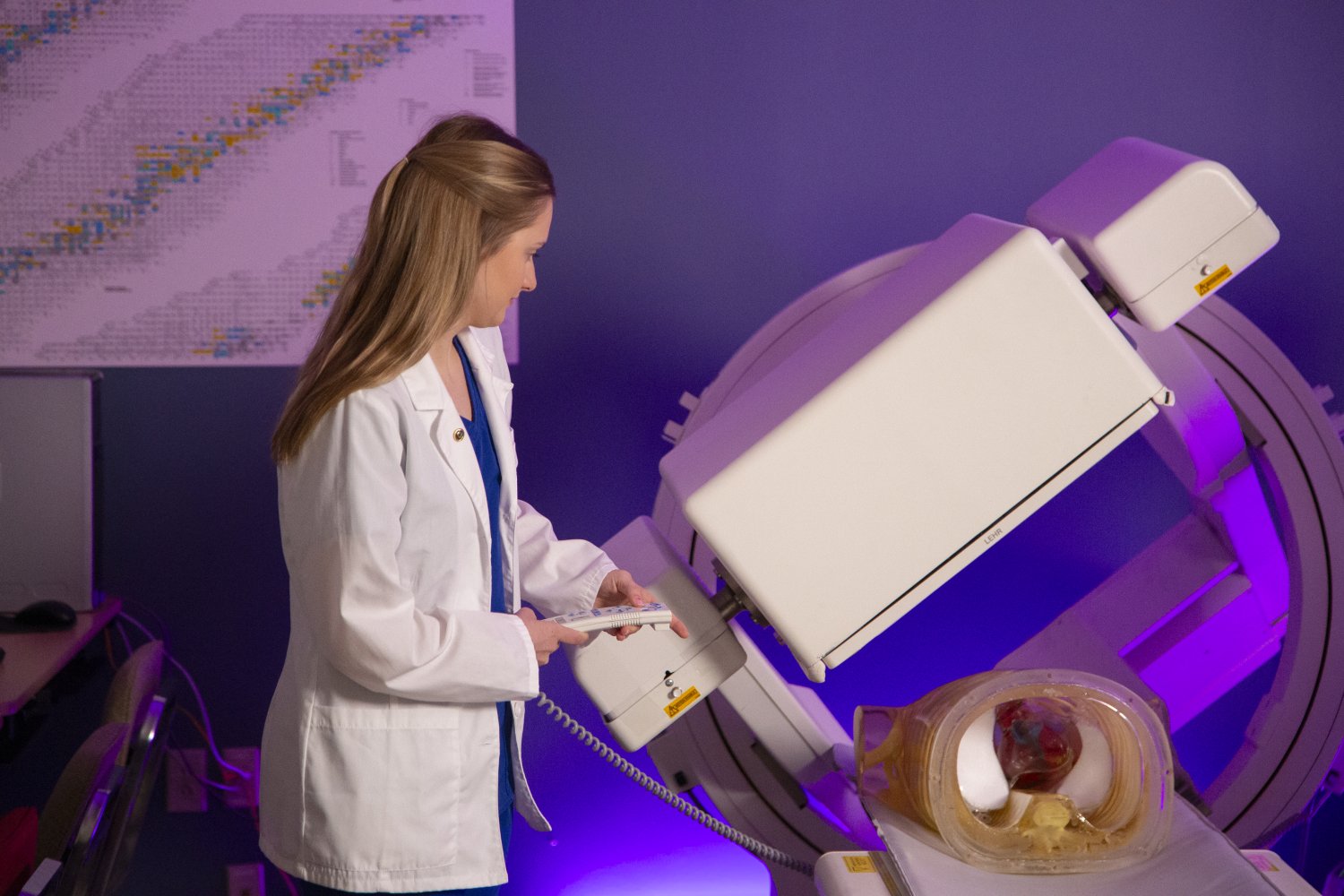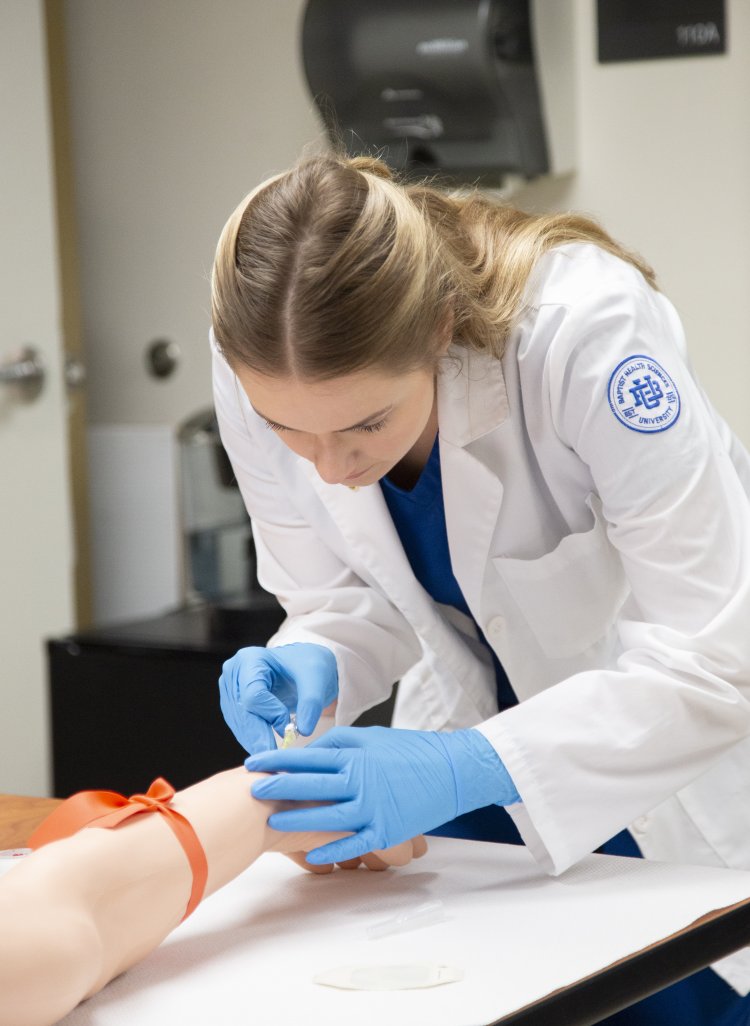Program Overview
- Bachelor's Degree
- RT(R) to BS
The nuclear medicine technologist is a highly specialized health care professional who works closely with nuclear medicine physicians, radiologists, oncologists, and cardiologists. Technologists administer the radioactive pharmaceuticals to patients and use specialized equipment to obtain images of the distribution of the radioactive pharmaceutical in the body. This imaging technique provides information about both the structure and function of virtually every major organ system in the body.
An exciting aspect of the nuclear medicine professional curriculum is that students not only gain knowledge in general nuclear medicine, students also have the opportunities to study specialty areas such as positron emission tomography (PET), nuclear pharmacy, nuclear cardiology, and computed tomography (CT). Courses are taught in classroom and laboratory environments where student can participate in individual and small group learning activities. Students gain clinical experience in a laboratory on campus and in nuclear medicine and radiology departments of hospitals and specialty clinics.
$92,500 Median Salary
U.S. Bureau of Labor Statistics for Nuclear Medicine Technologists
Bachelor's Degree
A pathway for freshmen and transfer students to complete their Bachelor of Health Sciences in Nuclear Medicine Technology
RT(R) to BS
Advance your career by earning a Bachelor of Science degree in Nuclear Medicine Technology. Students who have earned an RT(R) credential will receive 25 hours of block credit toward their bachelor’s degree in Nuclear Medicine Technology. The 18-month, full-time nuclear medicine professional curriculum includes the structured educational requirements for Computed Tomography (CT).
TENNESSEE TRANSFER PATHWAY
Many applicants enter Baptist University of Heath Sciences (Baptist University) with some college-level work completed. If you are transferring from a two-year college that participates in the Tennessee Transfer Pathways (TTP), please visit the TTP website for more information. Students who obtain an imaging sciences TTP from a participating community college in Tennessee will take the credits from the sample curriculum.
applying to the program
To be considered for selection to the Nuclear Medicine Technology program, applicants must meet the following minimum requirements.

Why Choose Nuclear Medicine Technology at Baptist University?
- Faith-Based Atmosphere
- Small Class Sizes
- Faculty Advisors
- Relationship with Baptist Memorial Health Care System
- Classroom, laboratory, and Clinical Experiences
- Clinical practicum coursesinclude clinical experience in all routine imaging procedures, pediatrics, nuclear equipment quality control, nuclear pharmacy, PET/CT, CT and nuclear cardiology

Technologists’ Primary Responsibilities
- Obtaining and critically analyzing patient history
- Monitoring patients’ physical conditions during procedures
- Preparing and administering radioactive chemical compounds, known as radiopharmaceuticals
- Labeling biologic specimens with radioactivity
- Performing patient studies including imaging and therapeutic procedures
- Processing images using computer enhancement techniques
- Evaluating images to determine technical quality
- Providing images, quantitative data analysis and patient information to physicians for diagnostic interpretation
Program Learning Outcomes
Upon completion of the NMT program, the graduate will be able to:
- Function as a knowledgeable entry-level nuclear medicine technologist.
- Exercise independent judgment and critical thinking skills in the technical performance of nuclear medicine procedure.
- Model attitudes reflecting professionalism, including effective communication skills, ethical care, and compassionate care.
Mission
The nuclear medicine technology (NMT) degree program of Baptist University will prepare competent entry-level nuclear medicine technologists to provide responsive, quality care, and service.
Program Accreditation
The NMT program is accredited by the Joint Review Committee on Educational Programs in Nuclear Medicine Technology (JRCNMT). The contact information for the JRCNMT is 820 W. Danforth Road, #B1, Edmond, OK, 73003, 405-285-0546, www.jrcnmt.org. The JRCNMT holds recognition from the Council for Higher Education Accreditation (CHEA).
Professional Credentials
Students successfully completing all nuclear medicine degree requirements will receive a bachelor of science (BS) degree, with a major in nuclear medicine technology. Upon successful completion of degree requirements, students can become candidates to sit for the Nuclear Medicine Technology Certification Board (NMTCB) examination to earn credentials as a certified nuclear medicine technologist (CNMT) or the American Registry of Radiologic Technologists (ARRT) nuclear medicine technology certification examination to earn the ARRT(N) credential. Upon earning credentials as a nuclear medicine technologist by either of these credentialing agencies, graduates who have successfully completed the required Computed Tomography (CT) clinical competencies are also candidates for the ARRT (CT) registry. Graduates who have completed the required CT clinical hours and competencies are candidates for the NMTCB(CT) certification exam. Additional requirements for licensure may be required by the state in which you practice.
TECHNICAL STANDARDS
Technical Standards for Matriculation, Retention, and Graduation for Nuclear Medicine Technology
The Bachelor of Science (BS) degree with a major in Nuclear Medicine Technology (NMT) from Baptist Health Sciences University (BHSU) indicates the holder is competent to function as a competent entry-level nuclear medicine technologist. All applicants and matriculated students possess certain essential abilities and characteristics required for completion of the Nuclear Medicine Technology (NMT) program that consist of certain minimum physical and cognitive abilities and emotional characteristics. This is to ensure that candidates for admission, matriculation, and graduation are able to complete the entire course of study and participate fully in all aspects of nuclear medicine technology training, with or without reasonable accommodations. The NMT program has established technical standards, which outline the essential abilities and characteristics required for the completion of the program.
Baptist Health Sciences University’s Nuclear Medicine Technology program is committed to the admission and matriculation of qualified students and does not discriminate based on race, color, ethnicity, sex, gender, marital status, national or ethnic origin, age, disability, creed, or religion. Candidates with disabilities can request reasonable accommodations if needed to meet these technical standards by following the University’s policies and procedures and contacting Access Services. A candidate must be able to perform these outlined technical standards in an independent manner.
The national board examinations for nuclear medicine technology may have more stringent technical standards than outlined in this document.
Students who accept an offer of admission from Baptist Health Sciences University will be required to sign an affirmation regarding compliance with the technical standards. Should a student’s ability to meet the technical standards change at any point in the academic program, it is the student’s responsibility to report this to the Program Chair and Access Services.
Motor Skills
Student must be able to perform gross motor skills such as help lift or transfer patients, manipulate and/or move heavy nuclear medicine equipment, and perform delicate, detained, and difficult manipulative tasks such as venipuncture.
Mobility
Student must be able to stand or sit for extended periods of time. Student must be able to move from room to room and maneuver in small areas. Students must be able to reach and manipulate equipment to its highest point (6 feet).
Vision
Student vision must be sufficient for observation and assessment necessary for the care of patients and operation of equipment. Student must be able to see and distinguish black, white, and various color combinations on display devices and recorded images, allowing them to distinguish subtle changes in image detail.
Hearing
Student auditory ability should allow for detection of audible alarms and background sounds during procedures to ensure patient/staff safety. Student auditory capabilities should allow them to hear patient requests, monitoring devices, and instructions from staff or physicians made in a normal voice.
Communication
Student must be able to express, comprehend, and exchange information in English through written and verbal communication.
Intellectual
Student must have the ability to make clinical judgment using critical thinking. Student must be able to utilize electronic technology in didactic, laboratory, and clinical environment.
Behavioral and Social
Student must have the emotional maturity and stability to approach a highly stressful human situation in a calm and rational manner. Students are expected to exhibit integrity, honesty, professionalism, compassion, and display a spirit of cooperation and teamwork.
Reasonable Accommodations for Students with Disabilities
In accordance with the Americans with Disabilities Act (ADA), Section 504 of the Rehabilitation Act, and other applicable laws, Baptist Health Sciences University provides reasonable accommodations for otherwise qualified students with verified disabilities. An accommodation will not be provided if it would result in the fundamental alteration of the University’s programs, services or activities, or if it would impose undue financial or administrative burdens on the University. The office that assists students with disabilities at Baptist Health Sciences University is Access Services.
Additional information about Baptist Health Sciences University’s services for students with disabilities may be found at https://www.baptistu.edu. If student circumstances should change related to these technical standards, the student will promptly notify the Nuclear Medicine Technology Program Chair and/or Access Services if reasonable accommodations are required at any point.





